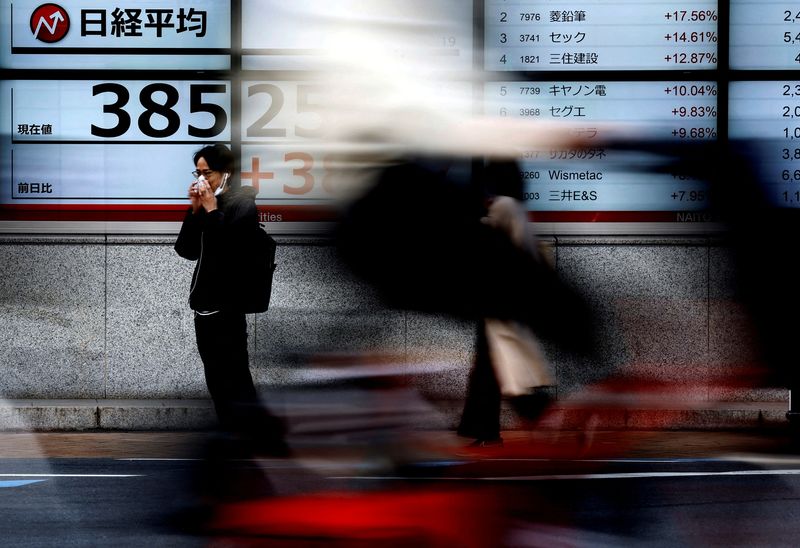By Jamie McGeever
(Reuters) - A look at the day ahead in Asian markets.
The global tech selloff spread across equity markets more broadly on Thursday, setting the tone for a choppy session in Asia on Friday as investors try and get to the end of a volatile week without incurring any more pain.
Japanese inflation will be the main local focus. These figures will go a long way to determining what the Bank of Japan does at its July 30-31 policy meeting - keep interest rates on hold, or hike another 10 basis points?
The MSCI World, Asia ex-Japan, and emerging market indices are on course for their biggest weekly losses in eight weeks, while Japan's benchmark Nikkei 225 index is set for its biggest weekly fall since April.
Tech has been bruised more severely, with a report that the United States is considering tighter curbs on exports of advanced chip technology to China weighing heavily on the sector.
Netflix (NASDAQ:NFLX) on Thursday reported a stronger-than-expected rise in subscribers in the second quarter but cautioned that third-quarter gains would be lower than the same period in 2023. Its shares fell in after-hours trading.
This comes a day after Taiwan's TSMC, the world's largest contract chipmaker, raised its full-year revenue forecast on surging artificial intelligence related demand for chips. Its shares still lost over 2% for a second straight day.
In China, investors are likely to be deeply underwhelmed by the outcome of the Communist Party's Central Committee meeting, known as a plenum, which they were watching for signs of much-needed stimulus to revive the struggling economy.
Chinese leaders reiterated their wide-ranging economic policy goals - modernizing industry, expanding domestic demand and curbing debt and property sector risks. But detail on how this will be implemented was very thin on the ground.
The focus switches to Japanese inflation. Economists polled by Reuters reckon core inflation picked up in June to a 2.7% annual rate from 2.5% in May. That would mean inflation has been above the central bank's 2% target for 27 months in a row.
Officials are worried that inflation is being powered by external factors rather than the domestic demand policymakers are trying to encourage.
But strong wage hikes have yet to be felt. Nearly 90% of Japanese households - the most in 16 years - expect prices to rise a year from now, according to surveys published last week.
More economists now reckon the BOJ will raise rates later this month by 10 basis points to 0.20%. This would follow its landmark move in March, when it raised rates for the first time in 17 years.
Japanese money markets are split fairly evenly between a hike or hold. Friday's data could tip the balance one way or the other.
Here are key developments that could provide more direction to markets on Friday:
- Japan CPI inflation (June)

- Malaysia GDP (Q2)
- Philippine central bank governor Eli Remolona speaks